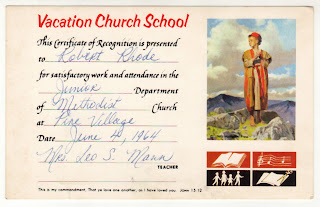I dutifully
saved the Vacation Church School post cards from the childhood years that I
attended. Although we called the two-week event “Bible School,” the post cards
use the expression “Church School.”
 |
| Postal Card from the Methodist Chuirch in Pine Village, Indiana, 1964 |
In my first
year, Mrs. Clarence Weyls* was the teacher, and the co-directors were Mrs. Tom
Builta and Mrs. Robert Davis. The teacher in my second year was Mrs. Enoch
Freeman. In my third year, the teachers were Joyce and Betsy, and Mrs. Jack Summers
was the superintendent. (Joyce may have been Joyce Snedeker, and Betsy may have
been Betsy Builta.) Mrs. Leo Mann was the teacher in my fourth year. In my
fifth year, Mrs. Leo Mann and Mrs. Amos Speck were the teachers. (As I recall, Mr.
Speck had passed away not long before.) Mrs. Builta was the director.
 |
| One of the Large Certificates Awarded Prior to the Postal Cards |
I well
remember all of the women named on the post cards. They had such distinctive
personalities!
Mrs.
Clarence Weyls, with the first name of Grace, was named appropriately. She was
only a few years younger than my grandmother, and she had a gracious outlook. Mrs.
Tom Builta, whose first name was Elizabeth, spoke with a southern accent; she was
as welcoming as she could possibly be. Mrs. Robert Davis, whose first name was
Joan, took a friendly interest in the achievements of each kid! Mrs. Jack Summers,
whose first name was Beulah, was accommodating and kind; she and her husband
ran the church camp ground. Mrs. Leo Mann, whose first name is Marilyn, had a
lively, artistic personality that I appreciated. Mrs. Amos Speck, whose first
name was Erma, carried herself with a regal bearing; she treated everyone with
her trademark serenity.
I wonder if
the staff members knew what profound effects they were having on children—even
if for only a dozen days annually. In those years, I became oriented toward the
future that I now occupy.
My mother
often warned me that, even though events might be unfolding smoothly for the
time being, the vicissitudes of life might well be visited upon me in the
future. When such tough times came, she said, I would need to rely on my faith,
for, without faith, circumstances could seem overwhelming. Now that I have
discovered many potholes in the proverbial road of life, I understand—and fully
appreciate—what my mother taught me. Further, I can see clearly that the women
of the Methodist Church—with their larger-than-life personalities—encouraged me
to remain faithful through every bump along the way. Am I thankful to them?
Yes, indeed!
__________________
*With
names, I am following the social conventions of the time. Married women usually
were called by their last names with the title “Mrs.” in front, as in Mrs.
Rhode. Customarily, they could be named for their husbands, as in “Mrs. Joe
Rhode.” Now and then, they might be called by their first name, as in “Mrs. Ida
Rhode.” Seldom in broader social contexts would they have been designated by
their first and last names, as in “Ida Rhode,” or by their first name only, as
in “Ida.” Of course, in informal conversation, the first name alone would have
been employed, as when a friend of Ida’s was chatting with her. I mention these
matters, as I have no interest in writing anything that might seem politically
tinged; I am merely recalling names as they were constructed at the time.

No comments:
Post a Comment